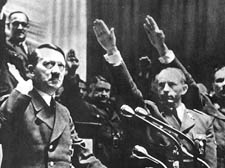| |

Hitler announces the German declaration of war on the US to the Reichstag in December 11, 1941 |
Choices that shaped our lives
Martin Sheppard assesses Ian Kershaw’s account of 10 critical decisions whose consequences we continue to live with more than 60 years on
Fateful Choices: Ten Decisions that Changed the World, 1940-1941. By Ian Kershaw. Penguin Allen Lane £30. order this book
THE key to the 20th century, and indeed to the 21st, was the Second World War. Hitler’s defeat paved the way for American and Soviet dominance in the years that followed, while Japan’s eclipse opened the door to Chinese dominance of the Far East.
In that war, decisions taken between May 1940 and December 1941 determined the outcome – and led to untold horror.
In Fateful Choices, Ian Kershaw, the distinguished biographer of Hitler, offers us privileged access to how 10 critical choices were made.
They include Hitler’s decisions to invade Russia, to declare war on America and to kill the Jews, and the Japanese decision to attack Pearl Harbour.
How each decision was made, and how far other choices were possible, varied in every case. Hitler and Stalin ultimately made their decisions alone, not heeding warnings or listening to counter-arguments. Mussolini, not even the head of state in Italy, had to wait for what seemed (briefly) too good an opportunity to miss to take Italy into the war. The British decision, in May 1940, to fight on despite the defeat of France, was taken by the War Cabinet of five people, including Churchill, Lord Halifax and Neville Chamberlain, after a sustained and reasoned debate over three days.
The Japanese decision-making elite consisted of many more people but was largely united in its choice for war. The American decisions, with President Roosevelt having to take the wishes of Congress and public opinion into account, were by far the most democratic. The United States’ entry into the war was decided for Roosevelt by American public reaction to Pearl Harbour.
Although many of the dictators’ decisions, including Stalin’s extraordinary refusal to believe that the Germans were about to attack, were in many ways arbitrary, few were completely irrational. The timing of Hitler’s decision to attack Russia was forced on him by his need to win the war quickly before American power tilted the odds against Germany, although the invasion itself fitted in, as did his killing of the Jews, with his long-term ideology.
The Japanese decisions, to exploit the opportunity presented by the European war to build their South-East Asian Co-Prosperity Zone and then to launch a pre-emptive attack on Pearl Harbour, are extraordinary for having being made despite the conviction of many of the Japanese leaders that their chances of victory were extremely remote.
This is a well produced, highly readable and consistently interesting book.
|
| |
|
 |
|
| |
 |



